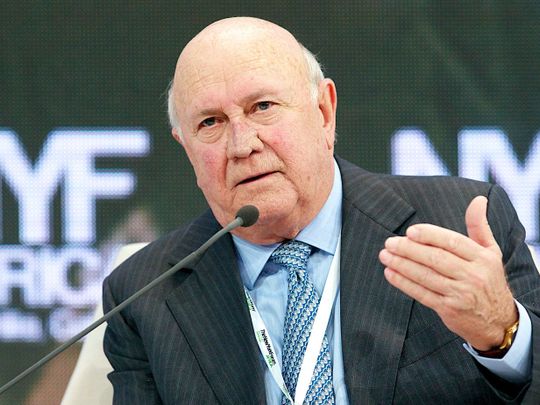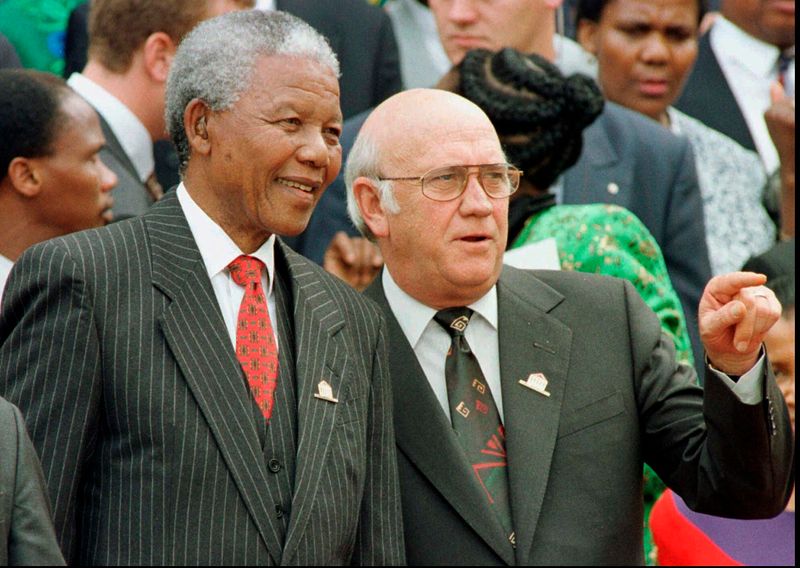
Dubai: Frederik Willem de Klerk, the last white president of South Africa, has died aged 85 on Thursday.
“It is with the deepest sadness that the FW de Klerk Foundation must announce that former President FW de Klerk died peacefully at his home in Fresnaye earlier this morning following his struggle again,” his foundation said in a statement. De Klerk died after a battle against cancer at his home in the Fresnaye area of Cape Town.
When de Klerk took the reins of power as president in 1989, apartheid South Africa was in its dying days. Since he was very much part of the conservative Afrikaner political establishment, no one expected him to rock the boat, and lead negotiations to end the hated, immoral and racist system of apartheid.
'Verkrampte'
Throughout his professional life, de Klerk had displayed no such antecedents either. He was a product of the system, and was firmly committed to upholding the privileges the white minority enjoyed in South Africa. In fact, he was seen as being in the “verkrampte” or unenlightened camp of the ruling right-wing National Party.
But de Klerk was smart, and had enough foresight, to see the writing on the wall. He knew that domestic and international pressure on his regime, and the resultant dire economic conditions in the country, had rendered the status quo untenable.

Under his leadership, negotiations that had begun in secret with Nelson Mandela’s African National Congress continued, much to the chagrin of fringe elements in the National Party. In response to the continued opposition from hardliners, he called a whites-only referendum in 1992, which showed overwhelming support for ongoing reforms.
Earlier, in 1990, de Klerk made the momentous decision to free Mandela — then the world’s most famous prisoner — from the infamous jail in Robben Island. These negotiations would eventually lead to the first free and fair elections with equal voting rights for all — and to the birth of the new South Africa, which transformed itself into a multiracial democracy.
Speaking about the days leading up to the political settlement, de Klerk told Britain’s The Independent that he had been working on a package of measures that “would go much further than anyone expected and was intended to gain the moral high ground”.
Early life
De Klerk was born in Johannesburg on March 18, 1936. He was the son of Senator Jan de Klerk, a politician, who became minister in the South African government. His brother Willem, was one of the founders of the liberal Democratic Party.
De Klerk graduated with a law degree from Potchefstroom University in 1958 and practised law in Vereeniging in the Transvaal. In 1969, he married Marike Willemse, with whom he had two sons and a daughter.
In January 1989, then president P.W. Botha suffered a stroke and resigned from leadership of the National Party, while retaining the presidency. The post of party chief was filled by de Klerk.
In a dramatic move that same year, de Klerk said he would engage in discussions with Zambian president Kenneth Luanda on the problems facing South Africa. This infuriated Botha, who openly criticised de Klerk and resigned from the presidency. De Klerk became acting president, and following elections that year, became the president.
After almost 40 years of marriage, de Klerk divorced Marike in 1998, admitting to an affair with Elita Georgiades, wife of a Greek shipping magnate. He married Elita that same year. (On December 4, 2001, Marike was found strangled to death in her Cape Town apartment).
Nobel Peace Prize
De Klerk and Mandela were jointly awarded the Nobel Peace Prize in 1993. In its citation, the Nobel committee spoke of “ … their work for the peaceful termination of the apartheid regime, and for laying the foundations for a new democratic South Africa”.
At that time, and in the following years, there have been those who felt that de Klerk, as a lifelong adherent of the apartheid system, did not deserve the Nobel. In fact, he provided more ammunition to his critics last year when, in an interview to CNN, he seemed to imply that not all aspects of apartheid were “morally repugnant”.
A drawing by world-famous South African cartoonist Zapiro best illustrates this issue: in a cartoon dated December 21, 2005, Zapiro portrayed an imaginary “Nobel Square” at Cape Town’s Victoria and Alfred Waterfront. In the square are busts of the four South African Nobel Peace Prize laureates: Albert Luthuli, Nelson Mandela, Desmond Tutu and F.W. de Klerk. Only that unlike the other three that are standing tall, de Klerk’s bust is slanted, almost about to fall. And two schoolchildren remark: “That one’s on shaky ground.”
However, nothing he did or did not do can take away from the fact that de Klerk played a seminal role in the destruction of minority rule in South Africa.
In his own Nobel acceptance speech, he said that “the single most important factor which became the driving force towards a totally new dispensation in South Africa, was a fundamental change of heart. This change occurred on both sides which had been involved in conflict over decades”.
He noted that the change was not sudden; it was rather “a process of introspection, of soul searching; of repentance; of realisation of the futility of ongoing conflict, of acknowledgement of failed policies and the injustice it brought with it … The new era which is dawning in our country, beneath the great southern stars, will lift us out of the silent grief of our past and into a future in which there will be opportunity and space for joy and beauty — for real and lasting peace.”








